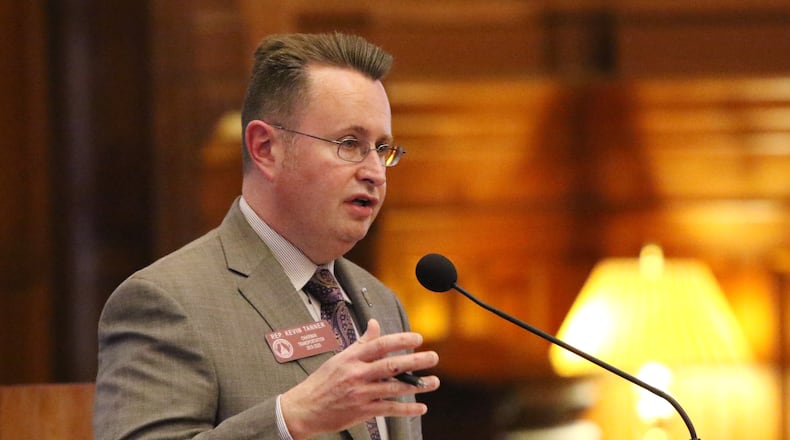A bill that could spark a transit expansion across Georgia cleared the House of Representatives on Thursday — but with a tweak that could eventually hit ride-hailing companies and their customers in the wallet.
House Bill 511 would allow Georgia counties — once they receive voter approval — to raise sales taxes for transit expansion. And it would launch pilot programs to help transport unemployed Georgians to jobs.
The bill would pay for those programs by dedicating the state sales tax on rides for hire to transit - a change from the original bill.
» Live: Use AJC tracker to follow Georgia bills
» Photos: Crossover Day at the Georgia Legislature
HB 511 originally replaced the state’s sales tax on rides for hire with a 50-cent flat fee for taxi, limousine and ride-hailing service rides and a 25-cent fee for shared rides — fees Uber and Lyft had agreed to support. But the version that passed the House by a vote of 159-11 replaces the flat fee with language that would keeps the sales tax and dedicates it to transit.
Uber and Lyft currently don’t pay sales taxes and say they’re not required to under state law. State officials disagree. The matter may be decided in court.
If the state wins, Uber and Lyft customers could pay more for each ride. How much more would depend on the length, time and location of a trip.
For example, earlier this week a trip from Morehouse College to the Capitol would have cost 67 cents in sales tax — or 17 cents more than the flat fee. But the tax on a trip from Atlantic Station to Hartsfield-Jackson International Airport would have cost an extra $1.30.
Uber spokeswoman Evangeline George said applying the sales tax to ride sharing would mean Georgia customers would pay the highest taxes on ride-hailing services in the country.
“We hope to continue our conversations with legislators about a reasonable fee structure that makes sense for riders and drivers,” she said.
The change to the transit bill highlights a long-standing dispute between ride-hailing companies and the state over sales taxes. Currently, taxi and limousine companies pay sales taxes, but Uber and Lyft don’t. They say they’re technology companies, not transportation companies subject to the sales-tax law.
The Department of Revenue disagrees and recently billed Uber for $22.1 million in back taxes, penalties and interest it says the company owes. Uber has appealed the bill to the Georgia Tax Tribunal, a special court that handles such disputes.
State Rep. Brett Harrell, R-Snellville, has sponsored separate legislation, House Bill 276, which would also require ride-hailing companies to pay sales taxes. In comments on the House floor Thursday, he praised the transit bill as "a very bold proposal" and downplayed its sales-tax provision.
“This bill has no new taxes of any kind,” Harrell said. “It recognizes the will of the General Assembly to appropriate from growing ride-share revenues funding to implement these rural transit projects.”
The 50-cent fee was estimated to raise $30 million to $60 million for transit programs. It’s unclear how much the sales tax would raise, though it likely would be substantially more.
HB 511 is the General Assembly's latest effort to encourage transit expansion. Last year it approved a law that allows 13 metro Atlanta counties to raise sales taxes for transit construction and operations.
The latest bill focuses on the rest of the state and would divide it into eight zones for the purposes of transit funding and planning. It also would create pilot programs that would provide transit vouchers or credits to the unemployed and tax credits to companies that subsidize their employees’ transportation to work.
Separate pilot programs would benefit metro Atlanta communities.
State Rep. Kevin Tanner, R-Dawsonville, the bill's sponsor, said the pilot programs would allow Georgia to test different ideas. If they work, the could be expanded.
Among other things, the bill would also consolidate state transit functions in a single new agency, though the State Transportation Board has objected to that plan.
Stay on top of what’s happening in Georgia government and politics at ajc.com/news/georgia-government/.
About the Author
Keep Reading
The Latest
Featured




